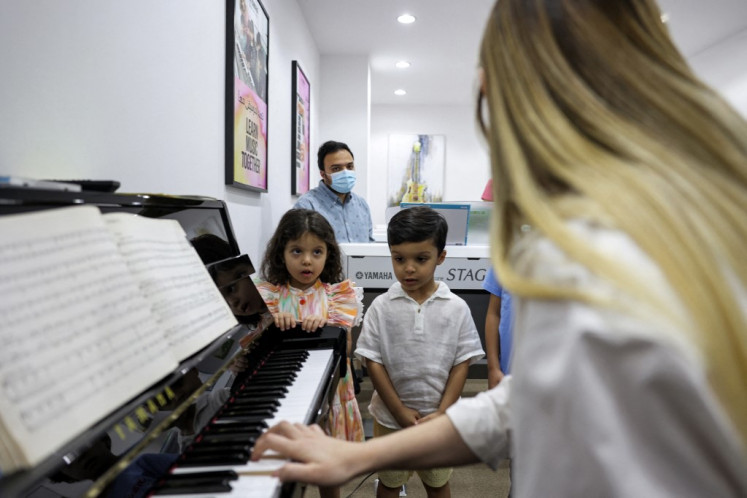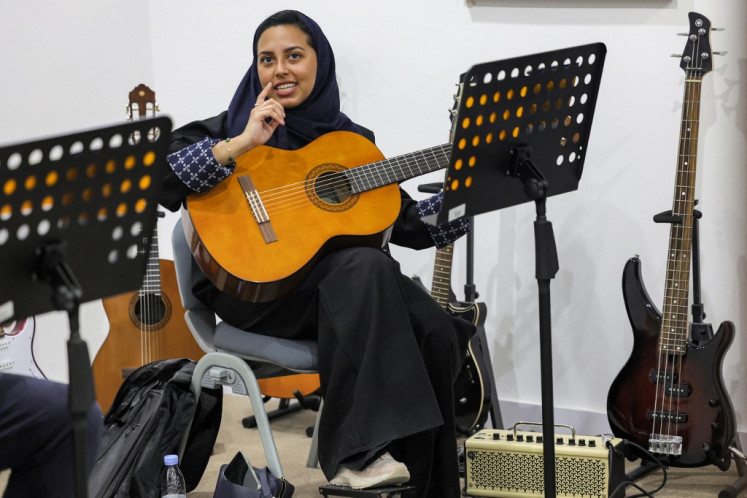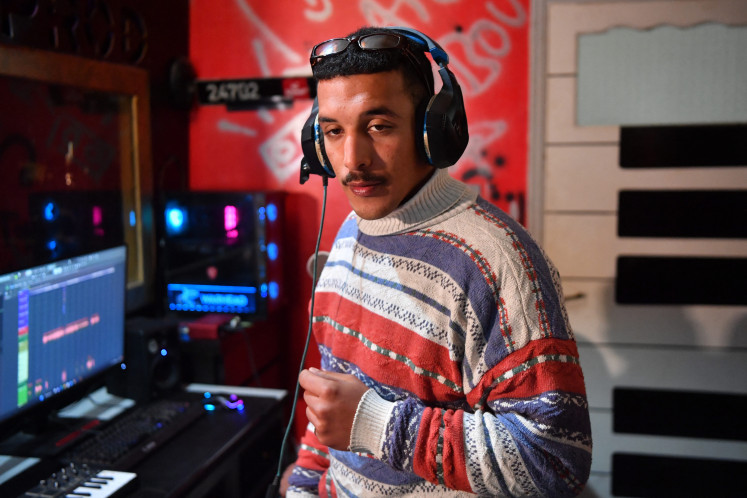Popular Reads
Top Results
Can't find what you're looking for?
View all search resultsPopular Reads
Top Results
Can't find what you're looking for?
View all search resultsStudents embrace new rhythms at Saudi music schools
Change text size
Gift Premium Articles
to Anyone
M
usic schools are popping up in Saudi Arabia’s big cities as some social restrictions are relaxed, including group music lessons.
Saudi Arabian businessman Ahmed Abdullah watches intently as his 7-year-old daughter Yasmine practices scales on a keyboard at a Riyadh music school, an opportunity he could only dream about when he was young.
Riyadh’s rulers have relaxed some social restrictions after decades of adhering to a rigid interpretation of Islam that, enforced by the kingdom's religious police, placed severe limits on social activities, including group music lessons.
"Now we are thinking about the next generation and investing in it," Abdullah said.
Previously, those who could afford it hired music tutors to come to their homes, while the rest struggled to find any instruction at all.
But as Crown Prince Mohammed bin Salman, the country's de facto ruler, seeks to expand entertainment options for citizens, music has become a bigger part of daily life and music schools are popping up in major cities.
At least five such schools have opened over the past few years in the capital Riyadh and in Jeddah, the kingdom's second largest city, located on the Red Sea, serving an enthusiastic clientele of children and some adults.
Yasmine's class, at the Yamaha Music Centre, meets every Saturday for half an hour, with its Egyptian instructor running students through keyboard drills under a sign reading "Music for All".
The session is bittersweet for her father, Abdullah, who thrills at his daughter's enthusiasm even as it reminds him of "things I had no chance of achieving in my childhood".
Access & equality: Music schools are starting to emerge in major cities in Saudi Arabia, following Crown Prince Mohammed bin Salman’s effort to expand entertainment options for citizens. Before, music lessons were generally restricted to well-off families that could afford private tutors. (AFP/Fayez Nureldine)Notes of change
Music has been a feature of the dramatic social reforms ushered in by Prince Mohammed, who became first in line to the throne five years ago.
For decades, the country was decidedly off the beaten path of most touring artists but in recent years, some of the world's biggest stars, including Justin Bieber and K-pop juggernaut BTS, have performed in the kingdom.
These marquee events have spurred allegations of complicity in a transparent bid to whitewash the kingdom's grim human rights record.
But there is little question that many young, entertainment-starved Saudis are grateful for the shows.
Last December, officials said more than 700,000 revelers flocked to the MDLBeast Soundstorm music festival in Riyadh, for four days of performances including a set by superstar French DJ David Guetta.
Daily life, too, has become more melodious, with restaurants and cafes staging live acts or blasting recordings through speakers, some even during prayer time, when in the past they would have been forced to close.
Several Saudis who are now trying to develop their own musical chops described the transformation as a boon to their mental health.
Wejdan Hajji, a 28-year-old employee at a firm selling medical supplies, said she once struggled to teach herself guitar by watching YouTube videos, lamenting that "if I made a mistake, there was no one to correct me".
Now she pays 940 Saudi riyals (US$250) each month for classes with a Ukrainian teacher at the Yamaha Music Centre.
"I didn't know anything, but now I've learned the basics," she said. "The one-hour session clears my mind. [...] My personality has changed, and I'm calmer."
Soothing souls: Wejdan Hajji, a 28-year-old employee at a medical supply firm, attends a guitar class at the Yamaha Music Centre in Riyadh. She has said that the lessons have helped her to become calmer. (AFP/Fayez Nureldine)Growing market
Such benefits could soon extend to many more young Saudis.
In 2020, the kingdom established a "Music Authority" under its culture ministry that grants licenses to music schools and provides backing to young talents eager to pursue careers in the music industry.
Some 100 private schools nationwide have included a music component in their curricula during the current academic year, according to an official tally. In May, the authority launched a "Music Culture Programme" to develop the skills of public school students as well.
As those initiatives get off the ground, specialized music schools continue to do brisk business.
One recent afternoon at the House of Music school in northern Riyadh, an instructor supervised five toddlers as they swayed to the sound of lullabies playing on a speaker.
The school opened in 2019, and has 300 students of all ages who come for lessons in rooms adorned with posters of performers like Bob Marley and Lebanese singer Fairuz.
"There is a good acceptance of the services we provide so far," said the school's Venezuelan director, Cesar Mora, adding that the school had a second branch in the works. "There is a growing music-loving community and market."
Walid Mahmoud, a 37-year-old Sudanese resident of Riyadh, began coming to the school so his young daughters could take lessons on the oud, a stringed instrument popular in the region. Before long, he signed up for lessons himself.
"Saudi Arabia has changed a lot," he said with a laugh as his daughters, aged 5 and 3, looked on. "Maybe we will form a band one day. Why not?"











